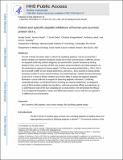| dc.contributor.author | Ryan, Jeremy | |
| dc.contributor.author | Letai, Anthony | |
| dc.contributor.author | Dutta, Sanjib | |
| dc.contributor.author | Chen, T. Scott | |
| dc.contributor.author | Kougentakis, Christos | |
| dc.contributor.author | Keating, Amy E. | |
| dc.date.accessioned | 2017-06-16T22:34:39Z | |
| dc.date.available | 2017-06-16T22:34:39Z | |
| dc.date.issued | 2017-06-16 | |
| dc.identifier.issn | 0022-2836 | |
| dc.identifier.issn | 1089-8638 | |
| dc.identifier.uri | http://hdl.handle.net/1721.1/109994 | |
| dc.description.abstract | The Bcl-2 family of proteins plays a critical role regulating apoptosis, and pro-survival Bcl-2 family members are important therapeutic targets due to their overexpression in different cancers. Pro-apoptotic Bcl-2 homology 3 (BH3)-only proteins antagonize pro-survival Bcl-2 protein functions by binding directly to them, and a sub-class of BH3-only proteins termed sensitizers can initiate apoptosis via this mechanism in response to diverse signals. The five pro-survival proteins Bcl-x[subscript L], Mcl-1, Bcl-2, Bcl-w and Bfl-1 differ in their binding preferences, with Bcl-x[subscript L], Bcl-2 and Bcl-w sharing similar interaction profiles for many natural sensitizers and small molecules. Peptides that bind selectively to just one or a subset of family members have shown utility in assays that diagnose apoptotic blockades in cancer cells and as reagents for dissecting apoptotic mechanism. Combining computational design, combinatorial library screening and rational mutagenesis, we designed a series of BH3 sensitizer peptides that bind Bcl-x[subscript L] with sub-nanomolar affinity and selectivity up to 1000-fold over each of the four competing pro-survival proteins. We demonstrate the efficacy of our designed BH3 peptides in assays that differentiate between cancer cells that are dependent on different pro-survival proteins. | en_US |
| dc.description.sponsorship | National Institute of General Medical Sciences (U.S.) (award P50-GM068762) | en_US |
| dc.description.sponsorship | National Institute of General Medical Sciences (U.S.) (award GM110048) | en_US |
| dc.language.iso | en_US | |
| dc.publisher | Elsevier | en_US |
| dc.relation.isversionof | http://dx.doi.org/10.1016/j.jmb.2014.09.030 | en_US |
| dc.rights | Creative Commons Attribution-NonCommercial-NoDerivs License | en_US |
| dc.rights.uri | http://creativecommons.org/licenses/by-nc-nd/4.0/ | en_US |
| dc.source | PMC | en_US |
| dc.title | Potent and Specific Peptide Inhibitors of Human Pro-Survival Protein Bcl-xL | en_US |
| dc.type | Article | en_US |
| dc.identifier.citation | Dutta, Sanjib, Jeremy Ryan, T. Scott Chen, Christos Kougentakis, Anthony Letai, and Amy E. Keating. “Potent and Specific Peptide Inhibitors of Human Pro-Survival Protein Bcl-xL.” Journal of Molecular Biology 427, no. 6 (March 2015): 1241–1253. © 2014 Elsevier Ltd. | en_US |
| dc.contributor.department | Massachusetts Institute of Technology. Department of Biology | en_US |
| dc.contributor.mitauthor | Dutta, Sanjib | |
| dc.contributor.mitauthor | Chen, T. Scott | |
| dc.contributor.mitauthor | Kougentakis, Christos | |
| dc.contributor.mitauthor | Keating, Amy E. | |
| dc.relation.journal | Journal of Molecular Biology | en_US |
| dc.eprint.version | Author's final manuscript | en_US |
| dc.type.uri | http://purl.org/eprint/type/JournalArticle | en_US |
| eprint.status | http://purl.org/eprint/status/PeerReviewed | en_US |
| dspace.orderedauthors | Dutta, Sanjib; Ryan, Jeremy; Chen, T. Scott; Kougentakis, Christos; Letai, Anthony; Keating, Amy E. | en_US |
| dspace.embargo.terms | N | en_US |
| dc.identifier.orcid | https://orcid.org/0000-0003-4074-8980 | |
| dspace.mitauthor.error | true | |
| mit.license | PUBLISHER_CC | en_US |
